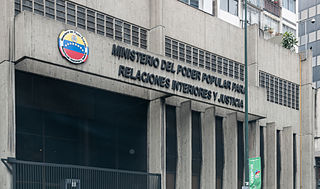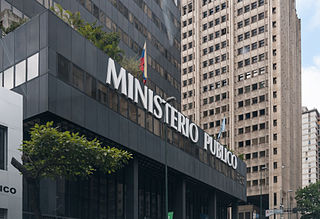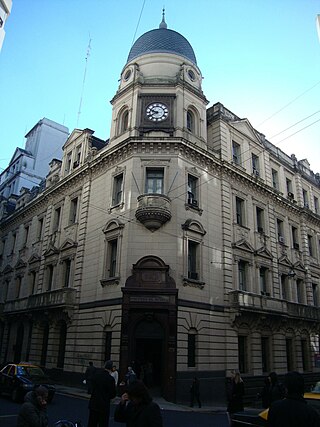Related Research Articles

This article deals with the diplomatic affairs, foreign policy and international relations of Uruguay. At the political level, these matters are officially handled by the Ministry of Foreign Relations, also known as Cancillería, which answers to the President.

The Panamanian Public Forces are the national security forces of Panama. Panama is the second country in Latin America to abolish its standing army, with Panama retaining a small paramilitary security force. This came as a result of a U.S. invasion that overthrew a military dictatorship which ruled Panama from 1968 to 1989. The final military dictator, Manuel Noriega, had been belligerent toward the U.S. culminating in the killing of a U.S. Marine lieutenant and U.S. invasion ordered by U.S. President George H. W. Bush.

The Supreme Justice Tribunal is the highest court of law in the Bolivarian Republic of Venezuela and is the head of the judicial branch. As the independence of the Venezuelan judiciary under the regime of Nicolás Maduro is questioned, there have recently been many disputes as to whether this court is legitimate.

The Administrative Department of Security was the security service agency of Colombia, which was also responsible for border and immigration services. It was dissolved on 31 October 2011 as part of a wider Executive Reform, and was replaced by the Dirección Nacional de Inteligencia (DNI).

The Cabinet of Ministers of Venezuela (Spanish: Gabinete de Ministros de Venezuela is one of the bodies that make up the Venezuelan executive in that country's presidential system, alongside the Council of Ministers. The Cabinet is headed by the president of Venezuela, and his corresponding vice president. The purpose of the ministries is to create, adopt, follow and evaluate policies, strategies, programs and projects in accordance with the constitution and the laws of the republic.

According to the Organic Law of Regional Governments, the regions are, with the departments, the first-level administrative subdivisions of Peru. Since its 1821 independence, Peru had been divided into departments but faced the problem of increasing centralization of political and economic power in its capital, Lima.
The Ministry of the Interior and Justice, was at national executive ministry of the Government of Colombia responsible for the enforcement of both law and administration of justice, equivalent to the justice and interior ministries of other countries.

The Mexican Secretariat of Public Security or Secretariat of Public Safety, also known as Ministry of Public Security and Ministry of Public Safety, was the federal ministry of the Mexican Executive Cabinet that aimed to preserve freedom, order, and public peace and safeguard the integrity and rights of the people. The Assistant Attorney General uses the Powers of the Union to prevent the commission of crimes, develop public security policies of the Federal Executive, propose policies on crime, administer the federal prison system, and administer justice to juvenile offenders based on the Organic Law of the Federal Public Administration and other federal laws, regulations, decrees, agreements, and orders of the President of the Republic. It had its headquarters in Álvaro Obregón, Mexico City.

The Ministry of Justice and Law, is the national executive ministry of the Government of Colombia responsible for the administration of law and justice, equivalent to the justice ministries of other countries.

The National Aeronaval Service of Panama, also called SENAN, is a branch of the Panamanian Public Forces which is responsible for carrying out naval and air operations. Its role is to perform protection, surveillance, security and defense of the air and maritime jurisdictional areas. The service has approximately 3,700 personnel, with 19 boats and approximately 24 aircraft.

The Ministry of the Popular Power for Interior, Justice and Peace is one of 39 agencies that make up the executive office of the Venezuelan government. This ministry is also called the Ministry of Popular Power for Interior Relations and Justice and Ministry of Interior and Justice.

The Public Ministry of Venezuela is an organ belonging to Citizen Power, it has autonomous and independent character. It is under the direction of the Attorney General of the Republic who is elected by the National Assembly for a period of seven years.

The Secretariat of the Interior of Argentina is a secretariat of the national executive power that manages issues pertaining to domestic politics such as immigration and co-ordination between the federal government and the governments of the provinces of Argentina.

The Ministry of Health of Argentina is a ministry of the national executive power that oversees, elaborates and coordinates the Argentine national state's public health policy. The ministry is responsible for overseeing Argentina's highly decentralized universal health care system, which according to 2000 figures, serviced over half of the country's population.

The National Police of Uruguay is a national and institutional police force of the Republic of Uruguay, founded on December 18, 1829. It depends on the Executive Power through the Ministry of the Interior. Its main mission is to protect the free exercise of rights and freedoms, guarantee order, internal security, ensure compliance with the laws, assist and protect people, prevent the commission of crimes, ensure security in public places and events, repress behaviors that constitute crimes and misdemeanors.

Elizabeth Gómez Alcorta is an Argentine lawyer, professor and politician. She was the first Minister of Women, Genders and Diversity of Argentina, serving under President Alberto Fernández from 10 December 2019 to 7 October 2022.

The Ministry of Agriculture, Livestock and Fisheries of Argentina, commonly known simply as the Ministry of Agriculture, was a ministry of the national executive power that oversaw production, commerce and health regulations in the agricultural, livestock and fishing industries.

The presidency of Luis Lacalle Pou began on 1 March 2020 when he was inaugurated as the 42nd president of Uruguay. Lacalle Pou, a member of the National Party took office following his victory over the Broad Front nominee Daniel Martínez in the second round of the 2019 general election, which ended the 15-year leftist rule in the country and the return of National Party to the Executive since his own father was the president in 1990–1995. On 16 December 2019, after his victory in the second round and before his inauguration, he announced his cabinet consisting of leaders of National, Colorado, Cabildo Abierto and Independent parties, members of the Multicolor Coalition.

The Government Delegation for the National Plan on Drugs is the executive body of the Spanish Ministry of Health, attached to the Secretary of State for Health, which is responsible for the management, promotion, general coordination and supervision of the services in charge of updating and executing the National Plan on Drugs.
References
- ↑ "Objetivos del Ministerio de Gobierno". Ministerio de Gobierno (in European Spanish). 2016-01-31. Retrieved 2018-07-18.
- ↑ "A Guide to Panama's Legal System and Research - GlobaLex". www.nyulawglobal.org. Retrieved 2018-07-18.
- ↑ "Galería de ex ministros para rescatar la historia". Ministerio de Gobierno (in European Spanish). 2016-11-24. Retrieved 2018-07-18.
- ↑ "Panama". U.S. Department of State. Retrieved 2018-07-18.
- ↑ "Senate Executive Report 104-3 - TREATY WITH PANAMA ON MUTUAL ASSISTANCE IN CRIMINAL MATTERS". www.gpo.gov. Retrieved 2018-07-18.
- ↑ Ley 15 del 14 de abril de 2010 (PDF) (15). Asamblea Nacional de Panamá. 2010.
- ↑ Ley 19 del 3 de mayo de 2010 (PDF) (19). Asamblea Nacional de Panamá. 2010.
- ↑ "Historia del Ministerio de Gobierno". Ministerio de Gobierno (in Spanish). 2016-01-31. Archived from the original on 2019-12-03. Retrieved 2018-07-18.